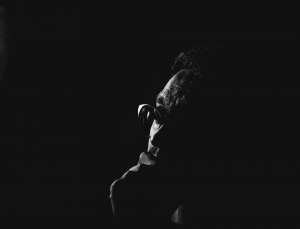It’s a terrifying yet fascinating thing to watch a tornado and the path of destruction it carves as it moves. Buildings and objects that we would normally consider to be immovable get picked up and thrown aside like leaves. Such awesome and terrifying power makes us question our significance and place in the universe. With the psalmist, we ask, “What are human beings, that you are mindful of them?” (Psalm 8).
 In a similar, but at times more profound way, the foundations upon which we build our lives can be shaken and torn asunder. Storms, whether real or metaphorical, can make us question the spiritual beliefs that we built our lives and understanding of the world upon. When we witness the depths of human depravity, and the apparent utter silence of God in the face of it, it’s not uncommon to ask, “God, do you see? Why aren’t you doing something?”
In a similar, but at times more profound way, the foundations upon which we build our lives can be shaken and torn asunder. Storms, whether real or metaphorical, can make us question the spiritual beliefs that we built our lives and understanding of the world upon. When we witness the depths of human depravity, and the apparent utter silence of God in the face of it, it’s not uncommon to ask, “God, do you see? Why aren’t you doing something?”
Depending on your spiritual heritage and the circles you move in, the idea of wrestling with your spiritual beliefs may seem foreign. Surely you should just believe, regardless of what happens, right? That approach toward spiritual or any other kind of beliefs can be dangerous.
While we may outwardly hold to our beliefs, inwardly a subtle shift may take place. It seems like people decide they no longer believe in God “out of the blue,” but, they likely stopped believing long ago, and it’s only now that they can say it aloud.
Not acknowledging our struggles and questions can lead to stress, anxiety, and a loss of joy. Rather than masking what we are feeling and experiencing, wrestling with our spiritual beliefs is healthy, not only emotionally and mentally, but spiritually as well.
Questions will come
Don’t be afraid of questions, but resolutely engage them. It is natural for things to come up that raise questions about our long-held beliefs. Rather than avoiding those situations, they can be treated as opportunities for growth. Some such circumstances include:
- experiencing trauma, witnessing traumatic events
- the loss of a loved one
- engaging with someone who holds different beliefs
- feeling let down by one’s spiritual community
- disappointment of one kind or another with God
 These and many other scenarios can create a spiritual crisis in which doubt may emerge, causing you to wrestle with your spiritual beliefs. While it isn’t easy or comfortable, the disorientation these questions raise doesn’t have to be the end.
These and many other scenarios can create a spiritual crisis in which doubt may emerge, causing you to wrestle with your spiritual beliefs. While it isn’t easy or comfortable, the disorientation these questions raise doesn’t have to be the end.
It’s possible to move from your original position of a familiar and comfortable orientation, experience the uncomfortable disorientation that comes through any one of the scenarios painted above, and then wrestle with that disorientation to move toward reorientation. This process can be long or short, but by wrestling with your spiritual beliefs, you can emerge as a better grounded and more empathetic individual on the other side.
It’s okay to wrestle with and doubt your spiritual beliefs
Earlier we pointed out that some people feel that they can’t doubt or wrestle with their beliefs. This either results in easy abandonment of their beliefs in the face of a challenge or doggedly holding onto something they cannot honesty account for and live out authentically.
For instance, many people in the Bible wrestle with God. The Psalms give us many examples of asking questions such as “How long, O Lord? Will you forget me forever? How long will you hide your face from me? How long must I bear pain in my soul, and have sorrow in my heart all the day?” (Psalm 13:1-2).
Another Psalm, which Jesus quoted while he was hanging on the cross, reads, “My God, my God, why have you forsaken me? Why are you so far from helping me, from the words of my groaning? O my God, I cry by day, but you do not answer; and by night, but find no rest” (Psalm 22:1-2). Or these words, “Why are you cast down, O my soul, and why are you in turmoil within me?” (Psalm 42:5).
 These are the cries uttered by people faithful to God, bewildered by their circumstances, and eager for God to show up and rescue them from a crisis. They don’t shy away from asking God questions, like a child who loves its father isn’t shy to ask penetrating questions that may seem out of bounds for some. There is a depth of relationship here that allows for those questions to be asked with confidence.
These are the cries uttered by people faithful to God, bewildered by their circumstances, and eager for God to show up and rescue them from a crisis. They don’t shy away from asking God questions, like a child who loves its father isn’t shy to ask penetrating questions that may seem out of bounds for some. There is a depth of relationship here that allows for those questions to be asked with confidence.
There are many other examples of people in the Bible working through their struggles, far too many to name here. Abraham, Jacob, Job, David, Jeremiah, Jonah, and many others. That’s not to mention individuals such as Paul, Peter, the Samaritan woman at the well, Thomas, and others from the New Testament, as well as the countless others throughout history that have walked the same path.
Prophets, kings, and everything in between – people from all levels of society struggled with their spiritual beliefs. More than anything, this indicates to us that struggling with our faith and spiritual beliefs is par for the course and that it’s okay to wrestle with questions.
Walking with fear and trembling
The presence of struggle with our spiritual beliefs doesn’t mean the absence of faith. Often, that struggle is about faith seeking understanding, as one Christian said centuries ago. Living faith, when confronted by something it doesn’t understand, seeks understanding.
It probes, it asks questions, it takes a posture of learning and humility. When you are confronted by situations that bring about a crisis, taking that posture is the most helpful thing to do. In those moments when you’re wrestling with your spiritual beliefs, one can take these steps:
Ask yourself and God the tough questions.
God is big enough to handle your questions asked in humility. Honesty with yourself is the best policy. The people in the Bible directed their questions to God, and that’s a practice we can all stand to apply
Give it time.
Sometimes the answers come quickly, but at times it’s a long, hard struggle with little fruit. The stakes are high, and hanging in there matters
Talk with others.

Sharing your struggles with people you trust may provide you the sounding board you need. Sometimes, puzzling it out with others might not give you the answers you seek, but it can provide you with strength for the journey.
Talking with a mental health professional such as a therapist, or speaking with a spiritual leader, or engaging a life coach to walk with you on your spiritual journey are some of the options available to you. If you’re in a spiritual community try to stay and wrestle together with the people in your community. They can keep you accountable and be a source of encouragement.
Be prepared to change.
Wrestling with your spiritual beliefs can leave you a changed person, and you need to be open to that. It’s scary, but that growth is needed. In the face of new information, you may need to adjust your thinking about some things.
That can be tough with all beliefs, including spiritual ones. But if we are honest with our wrestling, then we must be willing to set aside what isn’t helpful, true, noble, just, or praiseworthy (Philippians 4:8). When Paul was confronted by the reality and significance of Jesus, his whole life turned around and he became willing to die for something he’d tried his hardest to extinguish.
How do we walk with our doubts and wrestle with our spiritual beliefs? We can deal with them honestly, as many before us have done. Of the examples we saw in the Bible, people asked tough questions and worked through their issues while clinging to God in faith.
The practice of lament teaches us to direct our challenges toward God, to address him, and not turn away while we await his response. God is big enough for your tough questions, so keep engaging him and others honestly.
“Thinking Man”, Courtesy of Md Mahdi, Unsplash.com, CC0 License; “Difficult Roads”, Courtesy of Hello I’m Nik, Unsplash.com, CC0 License; “Looking Toward the Light”, Courtesy of Ifrah Akhter, Unsplash.com, CC0 License; “Thinking Man”, Courtesy of photosforyou, Pixabay.com, CC0 License








